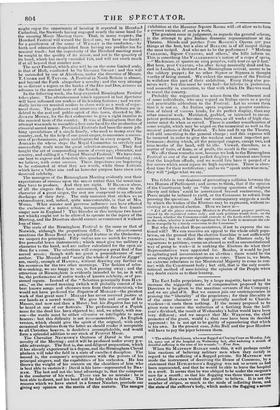The Globe is very desirous of preventing a collision between
the two Houses of Parliament; and seems to think, that if the opinion of the Constituent body on "time exciting questions of religious liberty and tithes" could be ascertained beyond controversy, the Peers might be induced to yield, or the Commons to refrain from pressing the questions. And our contemporary suggests a mode by which the wishes of the Electors may be expressed, without re- curring to a general election. Here we have it— Lit all the places returning Members to Parliament prepare petitions, signed ky the registered voters oily; and such petitions would show, on the one hand, whether the Commons could concede to the Lords with consent, or, on the other, whether it would be expedient for the Lords to terminate the col- lision tranquilly by a timely concession to the Commons."
But why do we elect Representatives, if not to express the na- tional will? We can conceive an appeal to the whole adult popu- lation, on the ground that the elective franchise is not sufficiently extensive ; but to collect the opinions of the Electors only, by signatures to petitions, seems an absurd as well as unconstitutional way of going to work—it is making the Electors do what their Representatives were appointed for. Besides, it would be just as agitating and inconvenient as an election : there would be the same struggle to procure signatures as votes. There is, we learn, an extreme reluctance in the Ministerial Majority to come in con- tact. with the Constituent body ; but still, that is the only consti- tutional method of asetetaining the opinion of the People when any doubt exists as to their leaning.




















 Previous page
Previous page